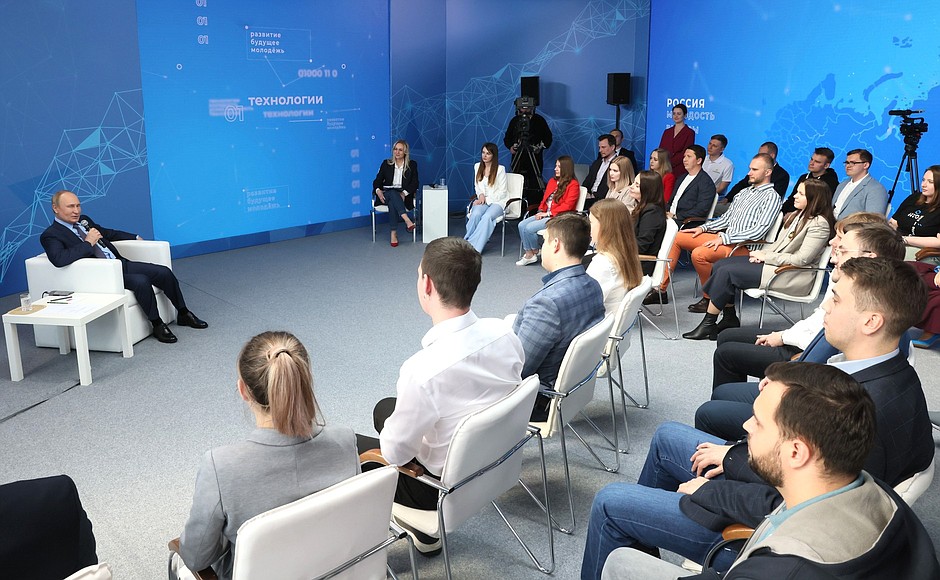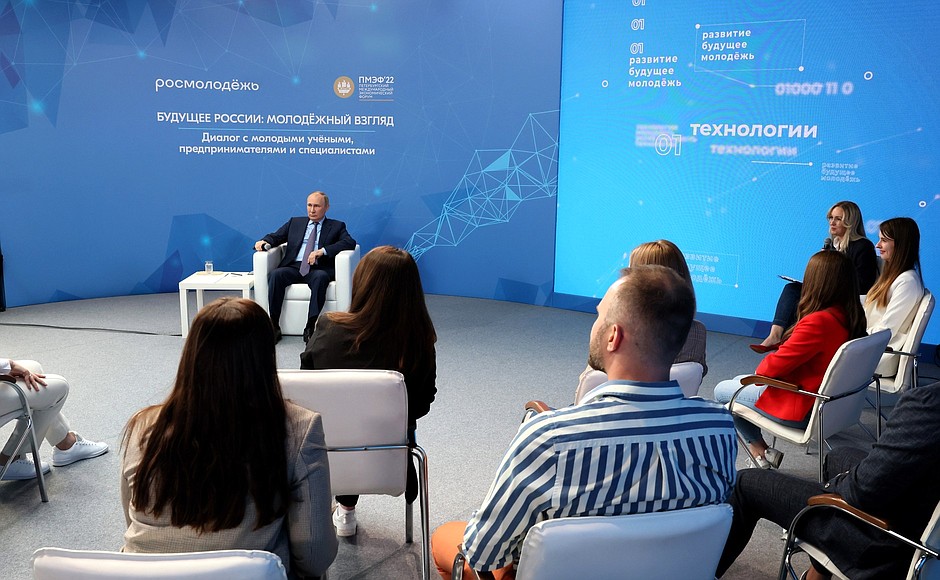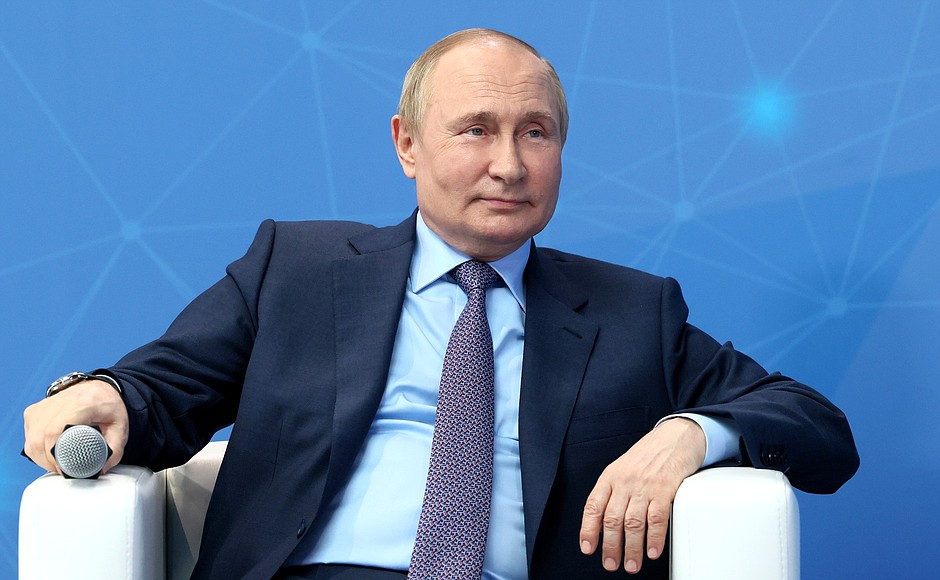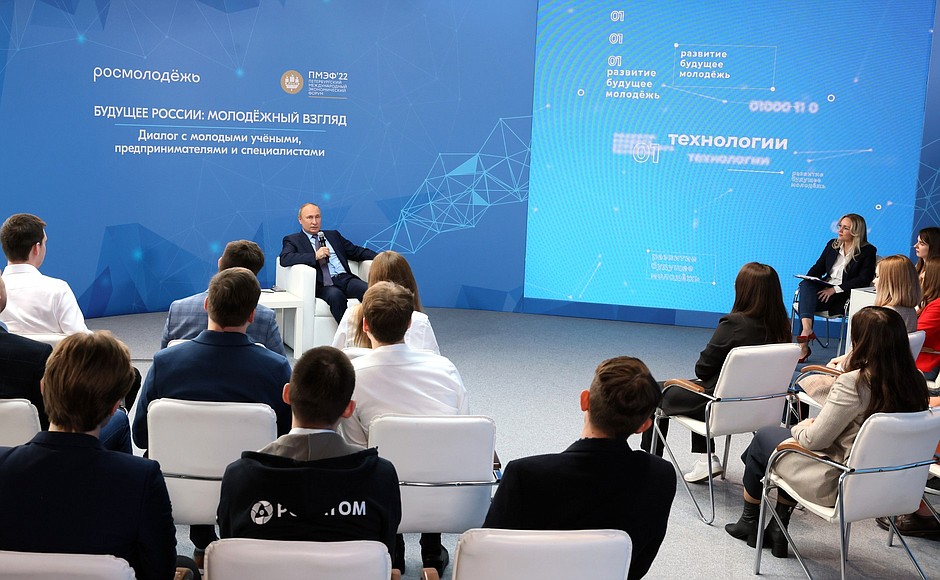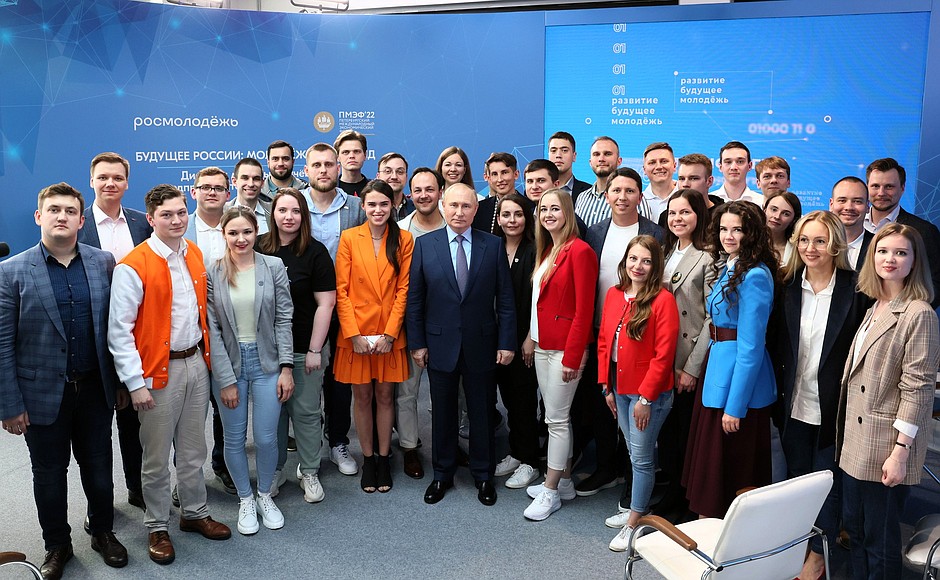Excerpts from the transcript of a meeting with young entrepreneurs, engineers and researchers
President of Russia Vladimir Putin: Good afternoon, friends.
I am very happy to see you,
Today, as we see, we are at VDNKh - a large park complex where all of Russia's best achievements in all major spheres of development have traditionally been presented for decades: achievements that have always been Russia's pride, that have helped it stay at the leading edge of development. We can say that over the last several decades our country has come a very long way in transformation and change, and this very complex of achievements - VDNKh - shows this progress in Russia.
You are young, but perhaps many of you know that this centre of achievements from Soviet times fell into a state of disrepair and was used for a cheap marketplace, but gradually, as the situation in the country improved, so did VDNKh. And now here we are, reviving the basic idea on which this exhibition centre was founded, which provides a place for you and people like you - young, beautiful, good-looking, smart, creative, and ambitious - to demonstrate your achievements. This is happening on a new basis, but still in a variety of areas.
Our meeting is being held in advance of the St Petersburg International Economic Forum, and I have asked my office and my colleagues from the Government to organise this meeting to hear your ideas on where we are now, where we are going and what we need to do to ensure our absolute and unconditional progress, to make it beneficial for the country and everyone involved in this remarkable process.
And I promise that I will try to respond to all your proposals and ideas. It is easier for me to do this than for you. I just give instructions; you need to come up with ideas, while I just need to listen to you and give instructions. (Laughter.)
This will certainly help me and my colleagues understand how we should organise work at the St Petersburg Economic Forum.
I would like to begin by saying the following. We live in an era of change; this is obvious to everyone; everyone understands and sees this. Geopolitical, scientific and technological transformations are happening. The world is changing, and it is doing so rapidly. In order to claim some kind of leadership - I am not even talking about global leadership, I mean leadership in any area - any country, any people, any ethnic group should ensure their sovereignty. Because there is no in-between, no intermediate state: either a country is sovereign, or it is a colony, no matter what the colonies are called.
I am not going to give any examples so as not to offend anyone, but if a country or a group of countries is not able to make sovereign decisions, then it is already a colony to a certain extent. But a colony has no historical prospects, no chance for survival in this tough geopolitical struggle. There has always been such a struggle (I just want to make it clear); it is not that we are looking at what is happening around us and saying "Wow!" It has always been like that, you see, and Russia has always remained at the forefront of ongoing events.
Yes, there were eras in the history of our country when we had to retreat, but only in order to mobilise and move forward, concentrate and move forward.
Sovereignty, in the modern sense of the word - actually, it has always been like that, but it is particularly clear today - comprises several components.
First, there is military-political sovereignty, and here, no doubt, it is important to be able to make sovereign domestic and foreign policy decisions and to ensure security.
Second is economic sovereignty where the development of the basic sectors of the economy does not depend on anyone in terms of critical technology or matters that underlie the viability of society and the state.
Technical sovereignty and social sovereignty are critically important in today's world. I am talking about the ability of society to come together to resolve national challenges, to respect history, culture, language, and all the ethnicities that share a single territory. This consolidation of society is one of the core conditions for growth. Without consolidation, things will fall apart.
There may be other components of sovereignty, I gave you the basic ones, and it is clear that all these things are interconnected. I gave you a list of four components. In fact, you could reverse the order and start from the last one and go backwards, and then list them randomly, because one cannot exist without the other. How do you achieve external security without technological capability and technological sovereignty? It is impossible.
We would never have hypersonic weapons if it were not for the capabilities of our science and industry. Never. You understand that fully only when you start dealing with these things directly. So, when we got hypersonic weapons, I asked for a list of developers to give awards to. I have already said this publicly before, but I will tell you again. They brought me a thick folder. I started flipping through it, but I saw that there were no peoples' names, only names of enterprises, design bureaus and research institutes. Frankly, even I was surprised. I asked the person who brought it to me what it was all about. He said that without even one name on that list, the product would not have been possible. Thousands of people worked on it, see? Thousands. And then I realised the depth and the capabilities of our defence industry.
The same is true of the economy in general. A limping, sneezing and coughing economy is the end of it. What kind of consolidation of society can we then talk about? And if there is no consolidation, there will be nothing else, either.
In order to be able to effectively possess and use all of that, it is necessary to address basic tasks, such as demography, which means healthcare, environment, research, education and upbringing, which is very important.
Some time ago I had a discussion with the Patriarch about education, and he happened to say that even though education was indeed crucial, without proper upbringing we would not succeed at anything, because you can teach a person something, but the question is how they will use their knowledge. Science, education, upbringing, and health care are critically important, because without them demographic issues cannot be resolved, and so on. What about culture? If we do not rely on the basic values of the national cultures of the peoples of Russia, we will not consolidate our society. Without consolidation, everything will fall apart. And the fact that we have to sort of defend ourselves and fight for it is obvious.
We visited the exhibition dedicated to the 350th birth anniversary of Peter the Great. Almost nothing has changed. It is a remarkable thing. You come to this realisation, this understanding.
Peter the Great waged the Great Northern War for 21 years. On the face of it, he was at war with Sweden taking something away from it... He was not taking away anything, he was returning. This is how it was. The areas around Lake Ladoga, where St Petersburg was founded. When he founded the new capital, none of the European countries recognised this territory as part of Russia; everyone recognised it as part of Sweden. However, from time immemorial, the Slavs lived there along with the Finno-Ugric peoples, and this territory was under Russia's control. The same is true of the western direction, Narva and his first campaigns. Why would he go there? He was returning and reinforcing, that is what he was doing.
Clearly, it fell to our lot to return and reinforce as well. And if we operate on the premise that these basic values constitute the basis of our existence, we will certainly succeed in achieving our goals.
You are experts in your fields, and I want to apologise upfront if I am unable to answer some of your questions. As a matter of fact, I would like to listen to your ideas in order to keep them in mind when organising the St Petersburg Economic Forum rather than turn our meeting into a Q&A session.
I would like to close my lengthy monologue with that and turn the floor over to our moderator. Please go ahead.
<...>
Vladimir Putin: (following up on remarks by Polina Morozova, Skoltech postgraduate student and materials chemist who works on developing new-generation K-ion batteries for uninterruptible power supply for fixed systems) The first thing I would like to point out is that you used the term "closed economy." Our economy will not be closed. We have never had one and never will. If anyone is trying to limit us in any way, they are limiting themselves in the first place.
For the sake of argument - this has nothing to do with you, but nonetheless - they are trying to put limits on our fertiliser exports only to see prices in their countries go up more than here. They tried to limit our energy exports and, again, prices went through the roof. They are already using my name instead of inflation when we have absolutely nothing to do with it. (Laughter.)
Seriously. That is the truth. We have absolutely nothing to do with it. This is the outcome of their mistakes, long-term ones at that, which they talked about every year even before today's developments. They made these mistakes themselves, and are now - excuse me, ladies - trying to cover a certain part of theirs, trying to turn this around on Russia, claiming that Russia is to blame for everything. We have nothing to do with it. They imposed restrictions and pursued their energy policies for years and decades on end, which led to the current state of affairs. And then they started imposing sanctions and aggravated the situation in these and other areas even more.
Your field is important and promising. Storing and transmitting energy using the latest high-tech methods is the future in the economy in general, in individual industries, and in the defence industry. Are you working on batteries?
Polina Morozova: Yes.
Vladimir Putin: We know what we are talking about: silent submarines and so on. This has an extremely broad range of applications.
In addition to oil and gas, rare earth metals are also here.
Should you need any additional support, we are here to help. The Ministry of Industry and Trade has a programme to support non-resource exports. We will expand these forms of support.
As for "the closed economy" as you said, I would like to say this again that we did not have a closed economy. That is, we had it in Soviet times when we isolated ourselves by creating the so-called Iron Curtain. We created it with our own hands. But we are not going to do this again and fall into the same trap. Our economy will be open. Those who do not want it will steal from themselves. They are already stealing from themselves and creating problems. If they continue following this path, they will just make a bad situation worse.
Yes, we will be short of something because those who are doing this do have certain competitive advantages, especially in modern technology. This is clear. However, the world is big and diverse. You have just mentioned China and India. But why just China and India? What about Latin America? Yes, Africa may be still "asleep" today but it is "waking up." About 1.5 billion people live there. And what about the whole of Southeast Asia? You should understand that it is impossible to build a fence around such country as Russia from the outside. And we are not going to build such a fence around our country.
But it is certainly necessary to help such start-ups as yours to enter world markets. We will be doing this, even more so since our trade and economic ties with these countries are making steady headway.
I think our trade with China is already US$140 billion. I believe during the past year our trade with China increased by 34 percent and with India by 87 percent. Do you understand? And do you know how much our trade with Turkey has gone up in the first half year? It increased 2.3 times. It is clear why but it has its own problems - high inflation and so on but it is developing and has advantages of its own. If we work with each other and we want to do this, there is only upside. The same is true of BRICS.
Two-thirds of the planet's population live in the regions I mentioned. Yes, some countries are only taking their first steps in some areas but they are taking them and will continue. Economic growth rates in these countries, in Asia, were about 5 percent, in the United States 1.7 percent and in the Eurozone 1 percent in the past ten years.
We also have our own problems and we are aware of them but we will keep moving rather than hide behind some fence.
But it is necessary to help people like you and we will. I will certainly discuss this with the Government and relevant structures that are in charge of supporting exports in our country. It is necessary to expand this support and we will definitely do so.
<...>
Yury Shilov: This question is frequently asked by young entrepreneurs: what, in your opinion, are three key qualities a leader should possess?
Vladimir Putin: Three qualities... This applies to all walks of life, science, whatever you like, even education and politics.
First, you have to be devoted to your work. I know that, perhaps, many will not like hearing it but, for example, in science, there was a well-known married couple, Marie and Pierre Curie, who sacrificed their health, life, absolutely everything, to achieve something they devoted their lives to. In education, our prominent teachers in the 1930s devoted their lives to children and achieved outstanding results. There were nuclear and rocket projects in our recent history... Sergei Korolev, Igor Kurchatov - they dedicated their lives to what they were doing and, in fact, they lived and breathed it.
This does not mean that you should confine yourselves to living in a sort of box. Clearly, you should have broad knowledge but still, to a certain extent, you should be devoted to your profession and dedicate your lives to it.
Second, flexibility is important and the ability to soundly and objectively assess the results of your work and have respect for people with whom you are trying to achieve goals to which you devoted your lives. Be critical but constructive, and you can mobilise a team.
The ability to work in a team, especially if you lead a team, is a key element of success. That is basically it.
<...>
Vladimir Putin: (in response to the remarks by Anna Krasavina, a research fellow of the Dukhov National Automatics Research Institute in charge of developing analogue systems for long-distance fibre-optic data transfer. As a developer, she is concerned over Russian microelectronics) Our Government has been trying for several years to launch or recreate Russia's microelectronics industry. This is a complicated issue and one of the hardest blows at Russia in this entire array of restrictions.
Actually, it has always been this way since the times of the Peter the Great. The ships he built, the methods of their construction and so on were largely secret in his time. So, Peter went to the West and acquired this knowledge by working as a carpenter. This continued throughout our history. COCOM lists in Soviet times and the like. It was like this even in the best years of our cooperation with our so-called Western partners. Restrictions were preserved. Now they have simply ratcheted them up, and this is one of the main blows. We decided we could sell oil and gas and buy everything cheap. In fact, we funded their work with our cheap energy resources. This is broadly speaking, of course, but it is essentially what happened. And so, owing to these restrictions, we are compelled, thank God, to develop our own engineering schools, including in this area.
I will also take everything you said from the transcript of our conversation today and I will talk to the Prime Minister about this, because he is personally dealing with this problem at my request.
To be continued.
